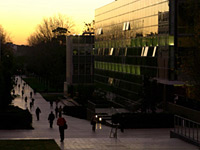Faculty Information and Assistance
Faculty of Science Website | Admission Requirements | Computing Information | Course Descriptions | Enrolment Procedures
|
|
Who Can Help?
This section of the Handbook is designed as a detailed source of information in all matters related to the Faculty of Science. For information and advice about course content and requirements, contact the appropriate schools/teaching units as indicated in the course descriptions.
For other general enquiries, contact the Science Student Centre, Robert Webster Building: tel: (02) 9385 6125, fax: (02) 9385 6127 or email: SSO@unsw.edu.au
The office is staffed between 9am and 5pm from Monday to Thursday and between 9am and 4pm on Friday, but this may vary during non-session times.
|
Please refer to the Faculty of Science website for further information: www.science.unsw.edu.au.
Graduates are advised to consult the Program Authority or Head of School or Department before making formal application for registration in any programs offered by the above schools.
For admission to all Masters degree programs (except Master of Statistics), candidates must have completed one of the following:
1. An approved degree of Bachelor with Honours.
2. An approved three-year program leading to the award of the degree of Bachelor plus an approved qualifying program. Suitable professional and/or research experience may be accepted in lieu of the qualifying program.
3. An approved four-year program leading to the award of the degree of Bachelor.
For admission to Graduate Diploma and Graduate Certificate programs, candidates must have completed one of the following:
1. An approved degree of Bachelor.
2. Academic and professional attainments as approved by the Postgraduate Coursework Committee of the Faculty.
The conditions governing these higher degrees are set out under the program entries in this Handbook.
In many cases, there are articulated programs whereby a student who performs satisfactorily in a Graduate Certificate or Graduate Diploma may be permitted to upgrade to a MScTech or Masters program in the same discipline. For further details students should consult their Director of Graduate Studies or Postgraduate Studies Coordinator.
For admission to all Masters degree programs (except Master of Statistics), candidates must have completed one of the following:
1. An approved degree of Bachelor with Honours.
2. An approved three-year program leading to the award of the degree of Bachelor plus an approved qualifying program. Suitable professional and/or research experience may be accepted in lieu of the qualifying program.
3. An approved four-year program leading to the award of the degree of Bachelor.
For admission to Graduate Diploma and Graduate Certificate programs, candidates must have completed one of the following:
1. An approved degree of Bachelor.
2. Academic and professional attainments as approved by the Postgraduate Coursework Committee of the Faculty.
The conditions governing these higher degrees are set out under the program entries in this Handbook.
In many cases, there are articulated programs whereby a student who performs satisfactorily in a Graduate Certificate or Graduate Diploma may be permitted to upgrade to a MScTech or Masters program in the same discipline. For further details students should consult their Director of Graduate Studies or Postgraduate Studies Coordinator.
Within the Faculty of Science, each of the schools manages or has access to undergraduate computing laboratories equipped with a combination of X-terminals, PCs and Macintoshes. These are connected through the campus-wide network and provide email access to all students.
Many of the schools also use computing extensively in research and postgraduate education. This is provided through local and, often, specialised facilities, and through access to regional and national centres. The systems accessible range is from PCs to supercomputers together with the associated peripherals and support personnel.
Further information on computing is available through each of the schools' web pages.
Many of the schools also use computing extensively in research and postgraduate education. This is provided through local and, often, specialised facilities, and through access to regional and national centres. The systems accessible range is from PCs to supercomputers together with the associated peripherals and support personnel.
Further information on computing is available through each of the schools' web pages.
Descriptions of courses can be found in the Online Handbook at legacy.handbook.unsw.edu.au.
Students are advised to consult with the program authority or relevant school for enrolment information and procedures. Entrance for students for whom English is their second language will be dependent upon achieving an adequate standard of written and spoken English.
The academic year for UNSW consists of two sessions, commencing in late February/early March and mid-July, respectively. It is preferred that new students arrive 2-3 weeks prior to the beginning of the session, so that they can undertake orientation prior to the commencement of formal teaching.
The academic year for UNSW consists of two sessions, commencing in late February/early March and mid-July, respectively. It is preferred that new students arrive 2-3 weeks prior to the beginning of the session, so that they can undertake orientation prior to the commencement of formal teaching.
A Message from the Dean | Faculty Information and Assistance | Summary of Programs









